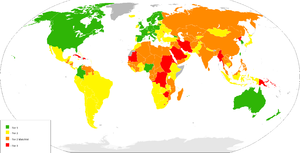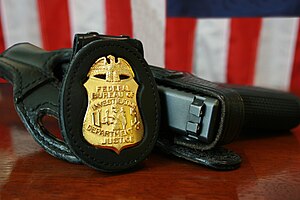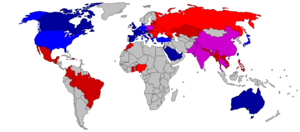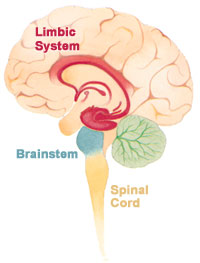| Trafficking In Persons Report Map 2010 (Photo credit: Wikipedia) |
“If you’re a good girl, we’ll let your family find your body,” A phrase that to this day, reverberates in my ear on a daily basis never changing. I can still hear his voice, smell him, and remember the chill that went down my spine as he said the words.
I never knew his name, still do not. But I can describe what he looked like, how he spoke, the utmost authority he seemed to command from all those around him. I can describe being dragged through an empty field and how I tried to run. I didn’t get far before he had me in his grasp again, chuckling as he puffed on his cigar. He casually pulled a pistol from his pocket and stuck it to my temple before whispering in my ear that horrid phrase.
I was a nineteen-year-old college student at the time, living in an upper-middle class neighborhood in the United States. That night, March 18 2004, I had just come home from work as a gymnastics coach and was more than ready to enjoy my dinner and a home to myself. My family had left for Spring Break the night before, but because of my schedule I elected to stay home.
I was distracted, unaware of my surroundings—my home—my driveway. I was safe. I was home. I only realized something was wrong when I heard something behind me. In an instant my world seemed to go in slow motion, a bag was suddenly thrown over my head at the same time that I unlocked my front door.
I was abducted by strangers, abducted by three people I had never seen or talked to before that night. They had no concern for my life, no concern for what they did to me. They delivered me to a house a few miles away from my home. They traded me for drugs. I was abducted and traded into a human trafficking ring in exchange for three “dime bags.”
Human trafficking.. modern day slavery. It occurs everywhere, including in the USA. Before my abduction, I didn’t think “that” happened HERE, only in other countries. Human trafficking is in itself a cluster of other violent crimes occurring at the same time. At least it was in my experience.
I remember literarily being “bought” and my traffickers being paid upwards of $1000.00 depending on what they were requesting. This is not a small crime, in one night, I “made” close to $10,000. None of which went to me.
| FBI Badge & gun. (Photo credit: Wikipedia) |
In fact, on multiple occasions, I was in direct view of first responders. Once, while at a fast food restaurant awaiting another “customer,” I was seated directly across from two police officers. I silently prayed they would look at me, see the signs of trafficking, see the signs of despair. My heart sunk when they smiled at me and spoke to my traffickers about some meaningless topic. I almost cried when they walked out the door.
I was in stores, restaurants, parks, out in public view and nobody could see what I was so desperately trying to plea. Help me. I look back and realize it wasn’t anyone’s fault, after all could anyone who is reading this tell me the signs to look for in human trafficking?
My ordeal lasted four days. During those days and nights I was tortured; I was buried alive as a form of punishment for disrespecting the leader and saying “no.” I later found out they didn’t want to kill me YET because I brought in the most money for them. On the fourth day I was taken to a motel out of state and sold again to a particular man who abused me.
Since then, this man has been identified. He killed himself in prison. While there is no concrete evidence that this man was tied to my case in anyway, I KNOW it was him. I cannot “prove it.” I cannot tell you much about him because he simply saw me and treated me as an object. But I can guarantee that this man was the man who screwed up. He screwed up because after he had handcuffed me to the bed, he proceeded to take a hit of heroin. He passed out cold and left the key within my reach.
I rescued myself when I unlocked those cuffs, stood up, dusted myself off and walked out that door without looking back.
Human trafficking in the real world is nothing like it is displayed in movies or books. Victims and survivors are not always gorgeous, do not always have someone looking for them, do not always fight and struggle.
And then there is this...
I was assaulted by well over a hundred men, the vast majority of them are free. Some of them seemed to believe that I was going to die because they didn’t bother covering their faces, some told me about themselves. A few were doctors, some were lawyers, one was a cop, one was a teacher, another a priest.
It’s been nine years since my abduction and every night I still have nightmares, I still feel like I am still there. It doesn’t just go away. It never will. I am still scared.
If you looked at me, I am not what most people think of when they think of a human trafficking victim. That’s because I am not. I am a survivor of trafficking, I am a daughter, a friend, a sister, a cousin and so much more. Those four days in hell have drastically changed my life, and I know that for the rest of my life it will haunt me. However, I can advocate for change, advocate for awareness, advocate for accuracy in portraying this problem. And hope that anyone who reads this has gained some insight into this crime.
I was in stores, restaurants, parks, out in public view and nobody could see what I was so desperately trying to plea. Help me. I look back and realize it wasn’t anyone’s fault, after all could anyone who is reading this tell me the signs to look for in human trafficking?
My ordeal lasted four days. During those days and nights I was tortured; I was buried alive as a form of punishment for disrespecting the leader and saying “no.” I later found out they didn’t want to kill me YET because I brought in the most money for them. On the fourth day I was taken to a motel out of state and sold again to a particular man who abused me.
Since then, this man has been identified. He killed himself in prison. While there is no concrete evidence that this man was tied to my case in anyway, I KNOW it was him. I cannot “prove it.” I cannot tell you much about him because he simply saw me and treated me as an object. But I can guarantee that this man was the man who screwed up. He screwed up because after he had handcuffed me to the bed, he proceeded to take a hit of heroin. He passed out cold and left the key within my reach.
I rescued myself when I unlocked those cuffs, stood up, dusted myself off and walked out that door without looking back.
Human trafficking in the real world is nothing like it is displayed in movies or books. Victims and survivors are not always gorgeous, do not always have someone looking for them, do not always fight and struggle.
And then there is this...
I was assaulted by well over a hundred men, the vast majority of them are free. Some of them seemed to believe that I was going to die because they didn’t bother covering their faces, some told me about themselves. A few were doctors, some were lawyers, one was a cop, one was a teacher, another a priest.
| Human trafficking. Main origin (red) and destination countries (blue). Data from United Nations Office on Drugs and Crime (UNODC) 2006 report (http://www.unodc.org/pdf/traffickinginpersons_report_2006-04.pdf) (Photo credit: Wikipedia) |
If you looked at me, I am not what most people think of when they think of a human trafficking victim. That’s because I am not. I am a survivor of trafficking, I am a daughter, a friend, a sister, a cousin and so much more. Those four days in hell have drastically changed my life, and I know that for the rest of my life it will haunt me. However, I can advocate for change, advocate for awareness, advocate for accuracy in portraying this problem. And hope that anyone who reads this has gained some insight into this crime.












